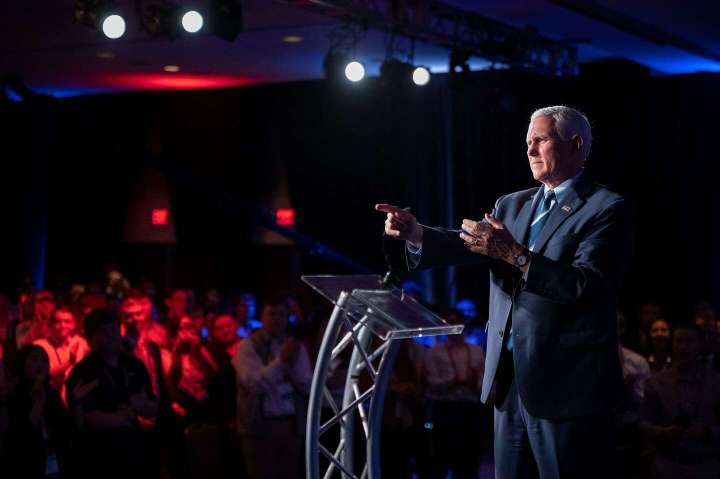Top aides to former vice president Mike Pence have emerged as key witnesses in the Jan. 6 investigations and have grown bolder in their public commentary as well. But for now, Pence remains content to let them do the work of helping make the case for a post-Trump Republican Party.
As Marc Short invokes Jan. 6 ‘massacre,’ Pence’s tightrope gets trickier

Pence used his speech to the Young America’s Foundation to offer only the gentlest of contrasts with Trump. Pence said he preferred to focus on the future rather than the past — read: the 2020 election, which Trump remains fixated on baselessly questioning.
“Some people may choose to focus on the past,” Pence said, adding: “We can’t afford to take our eyes off the road in front of us, because what’s at stake is the very survival of our way of life.”
When Pence was later asked in a brief Q&A session about Trump, he responded: “I don’t know that our movement is that divided. I don’t know that the president and I differ on issues. But we may differ on focus.”
Rhetoric about choosing to focus on the “future” rather than “the past” has been the line employed by many Republicans as code for potentially moving past Trump. Yet Pence spent much of his speech repeatedly invoking the phrase “Trump-Pence” — the “Trump-Pence tax cuts,” the accomplishments of the “Trump-Pence administration,” etc. He even mentioned Trump alongside Ronald Reagan as defining figures in the conservative movement, saying the agenda he was laying out was isolating the best ideas “from Reagan to Trump.”
Just a day before, though, the centrality of Pence aides in the Jan. 6 investigations was affirmed. The Wall Street Journal reported that two top aides — chief of staff Marc Short and legal counsel Greg Jacob — had testified to a federal grand jury examining Jan. 6. Short appears to be the highest-ranking White House official to testify for the panel.
Jacob in particular has emerged as a particularly potent witness. He has testified separately to the House Jan. 6 committee, telling the committee that two days before the Capitol insurrection, Trump lawyer John Eastman conceded that his and Trump’s plot to have Pence help overturn the election was illegal.
While the grand jury appearances were reportedly under subpoena, both have offered intriguing public comments as well, as punctuated by Jacob’s televised Jan. 6 committee testimony last month and Short’s media appearances Monday.
Short turned heads during an appearance on CNN in which he savaged Trump ally Rep. Matt Gaetz (R-Fla.) for saying: “Mike Pence will never be president. Nice guy; not a leader.” Short shot back that he was unconcerned about Gaetz because by 2024, Gaetz was likely to be “in prison for child sex trafficking” — a reference to a federal investigation into Gaetz’s alleged relationship with a 17-year-old girl.
Short: I don’t think Matt Gaetz will have an impact… in fact, I’d be surprised if he was still voting. It’s more likely he’ll be in prison for child sex trafficking… I’m surprised law enforcement lets him speak to teenage conferences like that pic.twitter.com/ALuay3VmoI
— Acyn (@Acyn) July 25, 2022
Short’s more noteworthy comment, though, might have come in an interview with ABC News.
He said that “if the mob had gotten closer to the vice president, I do think there would have been a massacre in the Capitol that day.”
Former Mike Pence chief of staff Marc Short tells @LinseyDavis: “If the mob had gotten closer to the Vice President” on Jan. 6 “there would have been a massacre in the Capitol that day. I’m not so sure the Secret Service’s lives were those in danger, though.” pic.twitter.com/NQoICTxDZy
— John A. Moreno (@morenojohn) July 26, 2022
Short didn’t lay the responsibility for that at Trump’s feet. But it was a striking choice of words, given that Pence has noticeably declined to press on Trump’s treatment of him vis-a-vis Jan. 6. Not only did Trump attack Pence as the insurrection was underway, tweeting about his vice president’s lack of “courage” even after, according to recently revealed evidence, he was aware of the violence and of his supporters’ having weapons; Trump also showed a remarkable callousness toward Pence in the aftermath of that day.
A long-burning question has been how Pence could just let that go — having been so personally endangered by that mob, one so obviously spurred by Trump’s quest to stay in power.
Pence has said very little about that issue publicly, and he has only infrequently carved out differences with Trump on Jan. 6, on occasions when the subject could scarcely be avoided. In February, in response to the former president’s remarks at a rally, he called Trump’s plot “un-American” and said Trump was wrong about what Pence could do that day as he oversaw the joint session of Congress.
But, increasingly, he seems happy to pursue a bifurcated approach, in which his aides do the speaking for him on that subject (to whatever degree he has or has not personally blessed it) — while he continues walking his 2024 tightrope in a party so dominated by Trump.
That’s probably the right strategy politically, with Pence potentially keeping himself in the good graces of enough Trump supporters to allow him to remain relevant — and crucially, avoiding further wrath from Trump — even as his aides deliver significant details that are apparently being used in a federal investigation. His aides can gesture in the direction of “this was very bad” and even implicate Trump and Co. in that very bad thing. But if nothing comes of it, Pence has plausible deniability that he truly pressed the case against Trump.
Of course, when your top aide is talking in terms of a near-massacre on Jan. 6, offering platitudes about focusing on the future, as if the past is not even worth adjudicating, may raise questions about one’s political fortitude and desire to truly lead the movement.






